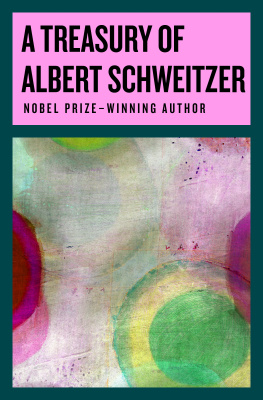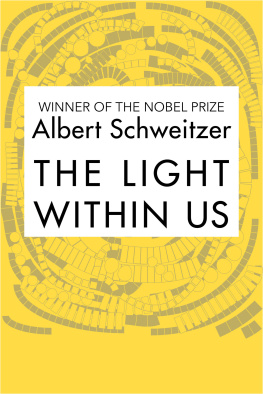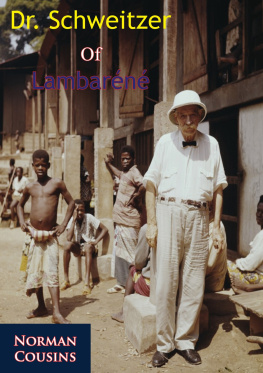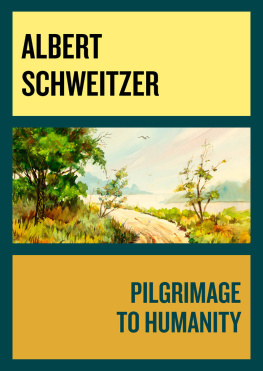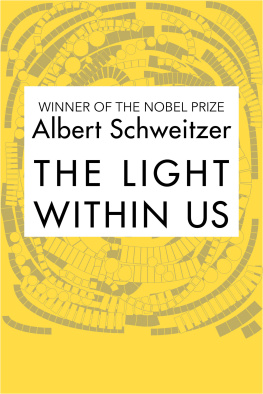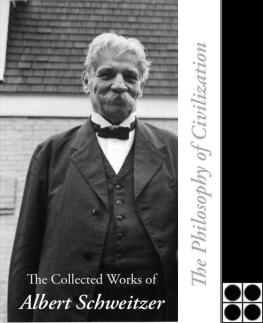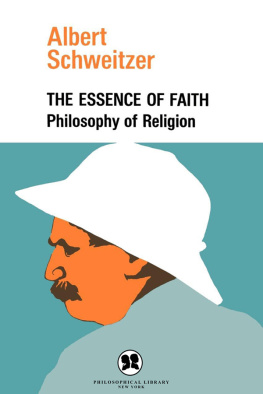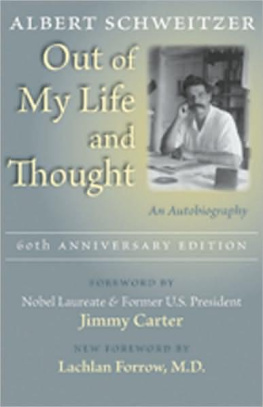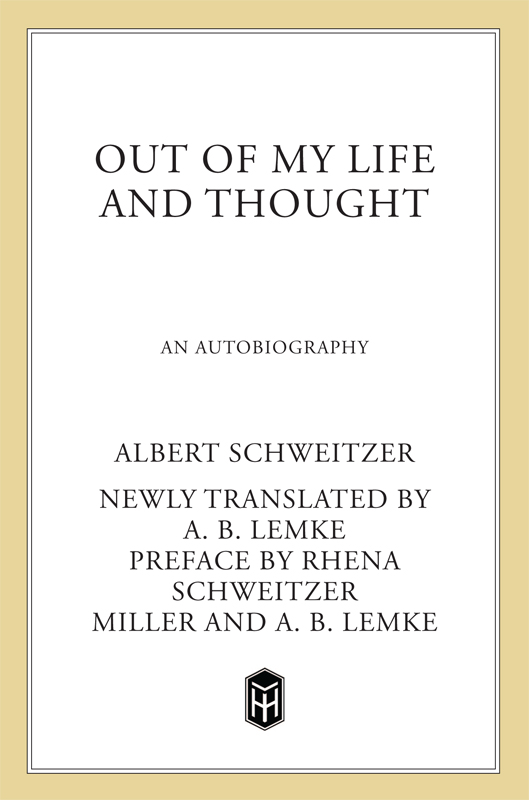Contents
Guide

The author and publisher have provided this e-book to you for your personal use only. You may not make this e-book publicly available in any way. Copyright infringement is against the law. If you believe the copy of this e-book you are reading infringes on the authors copyright, please notify the publisher at: us.macmillanusa.com/piracy.
Contents
Preface
I want to be the pioneer of a new Renaissance. I want to throw faith in a new humanity like a burning torch into our dark times. So Albert Schweitzer proclaimed in the preface to his book Civilization and Ethics in 1923.
Out of My Life and Thought, the book he considered his most important, provides the key to understanding the man, his thought, and his work. It is the testimony of this pioneer whose philosophy of respect for all life is essential if we are to succeed in moving from the dark ages of religious and political strife toward a new Renaissance embracing the recognition of human rights, of environmental responsibilities, and of political interdependence.
In this book he describes how he became Schweitzer the theologian, the philosopher, the musician, and the medical doctor. The many facets of his personality, his abundance of knowledge in such different fields made him the active and spiritual center of his hospital in Lambarn and a figure of worldwide influence and recognition.
As to the origin of his autobiography, he told the readers of the first edition of 1931: In 1925 I wrote a forty-two-page account for the seventh volume of the scholarly series Contemporary Philosophy in Self-Portraits, published by Felix Meiner in Leipzig. When this treatise was published as a separate book, many readers took it to be an account of my whole life and thought. To remedy this misconception I decided to complete the initial study in such a way that it would tell not only about my scholarly work but also about my life and thought in general.
Out of My Life and Thought is the only book Schweitzer completed in Africa, and thirty years later he wrote to a friend in Paris: That I was able to write this book I owe to the two physicians who assisted me in Lambarn. When they heard about the publishers interest, they offered to take over some of my work so I could be at the hospital only in the morning. By writing every afternoon and until midnight, I was able to complete the manuscript in five months. Later on I could never have taken so much time off to concentrate on my writing. It gave me the opportunity to express my thoughts on religion, on philosophy and the arts, and to pave the way for my reflections on the principle of Reverence for Life, which can motivate us to return to a civilization that is determined by humanism.
The first English edition of 1931 was translated by Schweitzers friend C. T. Campion and published in 1933 by Allen & Unwin in London and by Henry Holt in New York. Other translations followed, and at last count there were nineteen, from Chinese and Czech to Tamil and Tulegu. Some translations, for example that of 1959 in Oriyan, an Indian language, include prefatory letters by Hermann Hesse and Pre Dominique Pire.
According to the notes in Schweitzers personal German copy, a French translation was intended as early as 1932. Yet, as with several unfinished manuscripts, he did not find the time to devote to this project.
In 1953 another attempt at a French edition was made, when Madeleine France translated the German original. Schweitzer wanted to review the manuscript before its publication but he had other priorities. With his acceptance of the Nobel Peace Prize in 1954, his eightieth birthday in 1955, and his appeal in 1957 for a nuclear test ban, his days and nights were filled with correspondence and preparation of lectures, which were of pressing concern to him.
Finally, in 1959, during his last sojourn in Europe, Schweitzer spent three weeks in Paris. With his friend and collaborator Robert Minder he edited the French translation, which was published in 1960 by Albin Michel in Paris. When Schweitzer received the first copy in Lambarn in January 1960 he immediately wrote to the publisher, pleading for removal of the wrapper that read: Le grand docteur vous parle. This statement, The great doctor speaks to you, reminded Schweitzer of Hitlers announcement Le Fhrer vous parle, to which the French had been exposed two decades earlier.
The French edition contains several changes from the German original, especially the deletion of passages Schweitzer considered either too technicalsuch as some of his reflections on theological subjectsor displeasing to the French reader. This edition has been most helpful in the preparation of the new English translation, since many convoluted German sentences and long paragraphs were rephrased and broken up. Some phrases have been replaced by precise, more assertive statements.
In addition to the French version, the new English translation is based on a copy of the German edition in the Archives Centrales Albert Schweitzer at Gnsbach, which contains Schweitzers own corrections, made between 1930 and 1960.
Cognizant of the fact that it is impossible to give an identical rendering of any literary text in a second language, this translation aims to be as faithful as possible to the authors own style. No attempt has been made to change Schweitzers expressions, to degenderize or otherwise adjust the language in accordance with current trends. Special care has been taken with Schweitzers explication of his philosophy and theology. Where the earlier version freely substituted reason for spirit, scientific for scholarly, dogmatic for orthodox, the original meaning of the German expression has been chosen. An Evangelische Gemeinde is a Protestant parish and not a group of Evangelical believers, and when Schweitzer speaks about die Welt he intends to include the whole world and not only mankind. Thus, the new translation hopes to clarify ambiguities and to come as close as possible to Schweitzers language, his intentions, and his philosophy.
A chronology of the life of Albert Schweitzer, which follows the text, gives a quick overview of major events and completes the autobiography for the period until his death in 1965. For readers interested in other books by and about Schweitzer, a bibliography of selected titles in English has been included.
We want to express our deep gratitude to Gustav Woytt, a nephew of Schweitzer, who had worked for him for many years. He was familiar with the development and different translations of this book and graciously shared his knowledge. We owe to him and to the generous cooperation of the Archives Centrales Albert Schweitzer in Gnsbach, France, that we have a broader knowledge of the genesis of this book.
Our warmest thanks go to Miss Elizabeth Gempp, who has encouraged and generously supported the preparation of this new edition. For the typing and editing we would like to express our gratitude to Eileen Snyder and Margaret Sevcenko.
Last but not least we would like to thank the members of Henry Holt and Company, especially Mr. John Macrae for the enthusiasm with which he received the manuscript, and his advice throughout the publishing process, and Amy Robbins for her perceptive suggestions and expert copy editing.
For the photographs we are indebted to the Archives Centrales Albert Schweitzer in Gnsbach, France, the Albert Schweitzer Center in Great Barrington, Massachusetts, and the Albert Schweitzer Fellowship in New York.


